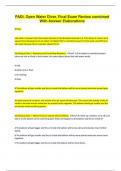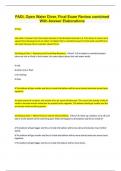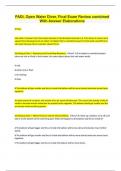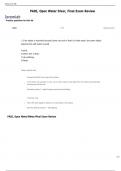Padi wreck diving - Study guides, Class notes & Summaries
Looking for the best study guides, study notes and summaries about Padi wreck diving? On this page you'll find 15 study documents about Padi wreck diving.
Page 2 out of 15 results
Sort by

-
PADI, Open Water Diver, Final Exam Review combined With Answer Elaborations
- Exam (elaborations) • 27 pages • 2023
-
- $19.49
- + learn more
PADI, Open Water Diver, Final Exam Review combined With Answer Elaborations D float. Salt water is heavier than fresh water because it has dissolved minerals in it. This means it causes more upward force (buoyancy) on an object. An object that is neutrally buoyant in fresh water would float in salt water because there is greater upward force. See Being a Diver I - Buoyancy and Controlling Buoyancy. Ans 1) If an object is neutrally buoyant (does not sink or float) in fresh water, the same ...

-
PADI, Open Water Diver, Final Exam Review combined With Answer ElaborationsPADI, Open Water Diver, Final Exam Review combined With Answer Elaborations D float. Salt water is heavier than fresh water because it has dissolved minerals in it. This means it c
- Exam (elaborations) • 27 pages • 2023
-
- $17.49
- + learn more
PADI, Open Water Diver, Final Exam Review combined With Answer Elaborations D float. Salt water is heavier than fresh water because it has dissolved minerals in it. This means it causes more upward force (buoyancy) on an object. An object that is neutrally buoyant in fresh water would float in salt water because there is greater upward force. See Being a Diver I - Buoyancy and Controlling Buoyancy. Ans 1) If an object is neutrally buoyant (does not sink or float) in fresh water, the same ...

-
PADI, Open Water Diver, Final Exam Review combined With Answer Elaborations
- Exam (elaborations) • 27 pages • 2024
-
- $15.49
- + learn more
PADI, Open Water Diver, Final Exam Review combined With Answer Elaborations D float. Salt water is heavier than fresh water because it has dissolved minerals in it. This means it causes more upward force (buoyancy) on an object. An object that is neutrally buoyant in fresh water would float in salt water because there is greater upward force. See Being a Diver I - Buoyancy and Controlling Buoyancy. Ans 1) If an object is neutrally buoyant (does not sink or float) in fresh water, the same ...

-
PADI, Open Water Diver, Final Exam Review Practice questions for this set Learn 1 / 7 Study with Learn 1) If an object is neutrally buoyant (does not sink or float) in fresh water, the same object placed into salt water would A sink. B either sink
- Exam (elaborations) • 15 pages • 2024
- Available in package deal
-
- $7.29
- + learn more
PADI, Open Water Diver, Final Exam Review Practice questions for this set Learn 1 / 7 Study with Learn 1) If an object is neutrally buoyant (does not sink or float) in fresh water, the same object placed into salt water would A sink. B either sink or float. C do nothing. D float. Choose matching term A become half the size it was at the surface. At 10 meters, the pressure is 2 bar. An air volume taken to this depth from the surface would decrease 1 and be...

-
PADI Open Water Diver Final Assessment
- Exam (elaborations) • 3 pages • 2024
-
- $13.99
- + learn more
PADI Open Water Diver Final Assessment Verified _____ travels faster in water than it does in air. This is why you cannot easily tell where it comes from - Sound A diver at the surface is moving quickly and jerkily, has the mask off the face, the regulator/snorkel is out of the mouth, and the diver does not respond to directions. The diver is... - Showing signs of distress (trouble) A group of Advanced Open Water Divers plans to make two dives. The first dive is on a reef in...

Do you wonder why so many students wear nice clothes, have money to spare and enjoy tons of free time? Well, they sell on Stuvia! Imagine your study notes being downloaded a dozen times for $15 each. Every. Single. Day. Discover all about earning on Stuvia


